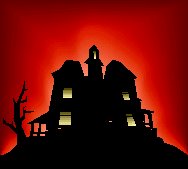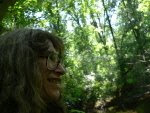Ghosts in an Empty House
 Anyone interested in an exploration of human consciousness must confront the touchy subject of ghosts. Unfortunately, purely scientific methods of investigation haven’t yielded inarguable results, except in the opinion of those willing to trust their own instincts, or the instincts of those they deem trustworthy. Ghost Hunters: William James And The Search For Scientific Proof Of Life After Death by Deborah Blum (The Penguin Press, NY, 2006), for example, details some experiments that strike me as conclusive, yet reviews of the book generally state the work of both the American and British Societies For Psychical Research (SPR) as having proved nothing--which suggests a disconnect in the definition of "proof."
Anyone interested in an exploration of human consciousness must confront the touchy subject of ghosts. Unfortunately, purely scientific methods of investigation haven’t yielded inarguable results, except in the opinion of those willing to trust their own instincts, or the instincts of those they deem trustworthy. Ghost Hunters: William James And The Search For Scientific Proof Of Life After Death by Deborah Blum (The Penguin Press, NY, 2006), for example, details some experiments that strike me as conclusive, yet reviews of the book generally state the work of both the American and British Societies For Psychical Research (SPR) as having proved nothing--which suggests a disconnect in the definition of "proof."Algernon Blackwood’s The Empty House (1906) is a fictionalized account of one of his own inquiries under the auspices of the British SPR; it rings true if you’re inclined to trust the author, as I am, and illustrates the concept of ghostly images re-enacting a scene involving an extraordinary degree of emotional power:
“…it is the aroma of evil deeds committed under a particular roof, long after the actual doers have passed away, that makes the goose flesh come and the hair rise. Something of the original passion of the evil-doer, and of the horror felt by his victim, enters the heart of the innocent watcher, and he becomes suddenly conscious of tingling nerves, creeping skin, and a chilling of the blood. He is terror-stricken without apparent cause.”
Blackwood's haunted house is dangerous in its ability to invoke a perhaps deadly fear in the beholder; that this involves an entity able to take advantage of that fear is ambiguously implied—if fear kills, can anyone know precisely how?
“He at once suppressed the memory of stories he had heard of ‘physical mediums’ and their dangerous phenomena; for if these were true, and either his aunt or himself was unwittingly a physical medium, it meant that they were simply aiding to focus the forces of a haunted house already charged to the brim. It was like walking with unprotected lamps among uncovered stores of gunpowder…the wholesale depletion of his vital forces…was for himself, the chief horror of the whole experience.”
Blackwood says in a 1938 introduction that "The Empty House" tells of “a commonplace mind that became clairvoyant and clairaudient from a flash of terror” and that “in most of these stories there is usually an average man who, either through a flash of terror or of beauty, becomes stimulated into extra-sensory experience." He mentions “that unfurnished haunted house in a Brighton square where I sat up to see a ghost with a woman beside me whose rather wrinkled face suddenly blanched smooth as the face of a child, frightening me far more than the ghost I never actually saw…” (Best Ghost Stories Of Algernon Blackwood, ed. E.F. Bleiler, Dover Publications, 1973)
E.F. Benson’s A Tale Of An Empty House (1925) (the title a tribute to Blackwood) illustrates the same concept, but depicts a greater degree of malevolence surviving or embedded in the ghostly scene, so potent as to physically attack a living witness. Again the violence is contained within the scene which remains somehow impressed upon the house, but there is something more, a consciousness capable of perceiving an interloper.
“At that moment not fright, but fear, which is a very different matter, closed in on me. Fright, as I understand it, is an emotion, startling, but not unnerving; you may under the finger of fright spring aside, you may scream, you may shout, you have the command of your muscles. But as that limping step moved down the passage I felt fear, the hand of the nightmare that, as it clutches, paralyses and inhibits not action only, but thought. I waited frozen and speechless for what should happen next.” (The Collected Ghost Stories Of E. F. Benson, ed. Richard Dalby, Carroll & Graf Publishers, Inc., NY 1996)
Many who are uncomfortable with the idea of sentient spirits are o.k. with the re-enactment concept (termed veridical phantasms by the SPR). This is reassuringly sane thinking linked to the magic of television: ghosts are merely reflections of those whose time is past, they can’t hurt us any more than we can be hurt through watching villains on a tv screen, and anything more complicated than that must be fiction.
But admitting the possibility of ghosts isn't the same as confirming their existence. Although everyone seems to know at least one true ghost story, publicly, many people would sooner admit to binge drinking than to a ghost sighting. Imagine the likely reaction if a candidate for president announced he planned to spend his first night in the White House in Lincoln’s bedroom with a ouija board. Apparently it is still not generally acceptable to speak of seeing, much less communing with, anything noncorporeal.
Does soul=spirit=ghost=mind=brain? If we could somehow thresh out our definitions to most people’s satisfaction, could we then agree to let the dying go in peace and stop fighting over whether removing life support machinery constitutes murder where a victim of modern medicine is, by his own definition, already dead?
Volume 1 Number 2 of H.P. Lovecraft’s Magazine of Horror http://www.wildsidepress.com includes a different kind of ghost story, "A Ghost Can Be Born" by Ray Russell, a case of astral traveling apparently suggested to the author by the premature senility or pre-senile dementia of a close friend (author Charles Beaumont):
“Must every molecule of flesh be cold before a ghost can be born? Who says so… If spirit is mind, and mind is brain, and a brain be all but snuffed out…then why may not a ghost be formed, a ghost composed of that which is already dead, those faculties forever dark, the part of Chet that mattered…”
The category of ghosts consisting of some evidence of a visit made by the dead to their survivors, particularly at the moment of death, has been well-documented throughout history in letter and literature, as well as in reports compiled by students of the occult. FATE Magazine’s department My Proof of Survival: Factual accounts by our readers of survival after death is a collection of readers’ reports, half a dozen or so vivid narratives monthly. http://www.fatemag.com It is inconceivable that any family is entirely bereft of these visitation experiences—unless they refuse to acknowledge them.
Frederic Myers and Edmund Gurney (founders, with Henry Sidgwick, of the British SPR) were thre Society's chief ghost investigators. Frederic (F.W.H.) Myers eventually wrote what is still the definitive scholarly volume on the subject, originally published in 1903, Human Personality And Its Survival Of Bodily Death. (My copy is the 1961 volume from University Books, Inc., ed. Susy Smith.)
Myers’ description of a ghost as a “manifestation of persistent energy” would seem to cover all the bases. William James, in a peevish 1903 review of the book quoted by Smith, wrote: “Anyone with a healthy sense of evidence, a sense not methodically blunted by the sectarianism of ‘science,’ ought now to feel that exalted sensibilities and memories, veridical phantasms, haunted houses, trances with supernormal faculty, and even experimental thought-transference, are natural kinds of phenomena which ought, just like other natural events, to be followed up with scientific curiosity.” Yet these are still radical constructs in 2006.
If you buy the idea that the world has been progressing over the centuries from ignorance to enlightenment, superstition to science, you are willing to take intuition for guesswork, synchronicity for coincidence, vision for hallucination caused by fatigue or a trick of the light.
Consider instead the idea that when we assume our forebears suffered from a lack of sophisticated technology we overlook the possibility that they lived in an extraordinary state of awareness. It’s not much of a stretch—we already take it for granted that someone who loses one of the five senses compensates by further developing the remaining four.
How might man have experienced his world, absent the option of imposing his will upon it? Is man evolving away from greater perceptive skills? Or are these skills becoming necessary again as we reach the limit of our power to alter the world or modify nature?
How much of “ancestor worship” may have arisen from an awareness of the continued presence of ancestors? Were ghost stories told in winter because cold and starvation brought these spirits into clearer focus?
Is there a thinner “veil between the worlds” on October 31? Is there some sort of veil we may lift at will whenever we truly desire a peek into the unknown, or when changing seasons remind us of the mysteries of birth and death? Is there a sixth sense that reveals we are like fish in a bowl, only dimly aware of a world beyond the glass?
Is there an altered state of consciousness involved in the perception of ghosts? The closing words of Blackwood and Benson’s tales are suggestive.
Benson’s: “…next moment we were out in the pelting rain, running for the ford. The deluge was sweet to my soul, it seemed to wash away that horror of great darkness and that odour of corruption in which we had been plunged.”
Blackwood’s: “With trembling hands Shorthouse opened the front door, and they walked out into the moonlight and drew a deep breath of the cool night air blowing in from the sea.”
What do you think of the altered state theory? It would explain the disparity of experience—or the lack of any experience at all—among those who encounter a ghost. For example, an informal narrative of my own, collected in Michelle Moore's Haunted Nights paranormal magazine, Volume 3, available via print or download at http://www.lulu.com/content/357807
Many such occurrences, such as the appearance of ghosts on the Gettysburg battlefield, are very well documented; there are a number of places online for serious or casual psychic investigators to share or augment such ghostly experiences, including:
http://www.ghost-stalker.com/
http://www.ghostsofgettysburg.com
http://www.atouchofdeath.com/
There's also an excellent Guide to Supernatural Fiction at http://homepages.pavilion.co.uk/users/tartarus/database.htm
Til next time—thanks for stopping by!





